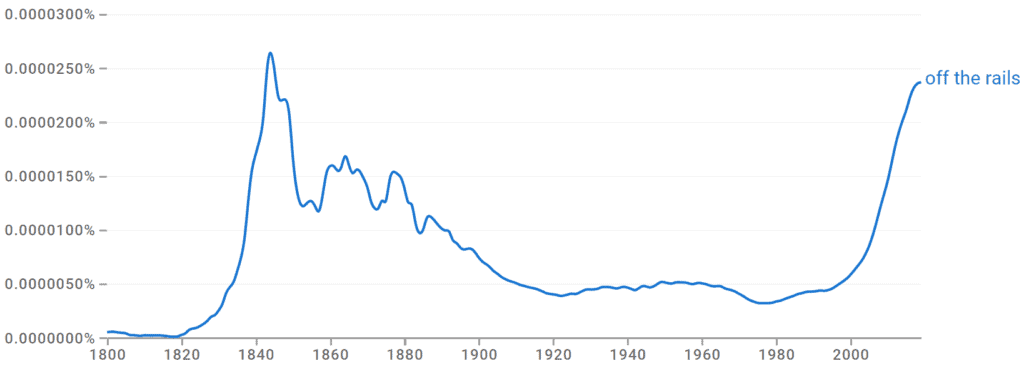I love it when idioms come from literal origins, like the phrase “off the rails.” I’m sure you’ve heard it spoken or read it in a book somewhere. But if you weren’t sure what it meant, this quick breakdown will explain everything and even show you how to properly use it within a sentence.
Off the Rails Meaning Explained

When something or someone is described as “off the rails,” it means that they have deviated from what’s usually considered normal or expected for the situation. You can use this phrase to describe situations or individuals who have gone awry or lost control.
A great example is my books. I’m known as a Romantasy (Fantasy Romance) author, but I once took a moment to whip up a Thriller novel. I know, weird. It’s not what I normally write, but readers still loved it. However, many of my reviews said things like, “Candace has gone off the rails with this one! And I like it!”
But that’s a pretty mild example. It’s more commonly used in situations where someone deviates so far from the plan or does something so out of character that it shocks everyone involved.
Origin of Off the Rails

To get to the roots of the phrase “off the rails,” you have to go back to the 1800s and the world of rail transportation, aka trains. When a train goes off the rails or is “derailed,” it veers off its intended track, leading to accidents, delays or general chaos.
Over the years, it just worked its way through the English language as an idiom, and here we are!
Using It in Different Tenses
“Off the rails” is actually a versatile expression that you can use in several tenses to describe different stages of chaos or deviation.
- Go off the rails: Used in the simple present or future tense to describe a situation or person currently straying from the norm or expected to do so in the future. “If we don’t stick to our budget, this project will go off the rails.”
- Gone off the rails: This is the present perfect tense form used to describe a situation or person that’s already deviated and lost control. “Ever since he lost his job, he’s gone off the rails.”
- Going off the rails: The present continuous tense version is meant to describe someone or something dramatically moving away from the situation at hand. “The party started calmly, but it’s going off the rails now that everyone’s dancing on the tables.”
What’s Another Word for Off the Rails?
- Out of control
- Haywire
- Go bananas
- Chaotic
- Astray
- Unruly
- Disorderly
- Unhinged
Off the Rails Examples in a Sentence

- The co-author project went off the rails when we started working on our own ideas and not working as a team.
- Candace’s life seemed to be going off the rails after a series of unfortunate events that never seemed to end.
- The once-peaceful protest quickly went off the rails and turned into a riot in the downtown area, so police had to step in and instill order.
- Dave was a model employee until he suddenly went off the rails and started showing up late every day and not wearing his uniform.
- The Zoom meeting was productive at first, but it quickly went off the rails when people started arguing over minor details, and no one could get a word in.
Stay on the Rails
Sometimes it’s okay to go off the rails, expand your horizons, and try something new. But, for the most part, this expression is used when someone or something has deviated, not just unexpectedly but in an unwanted way.
Check out some others we covered:
